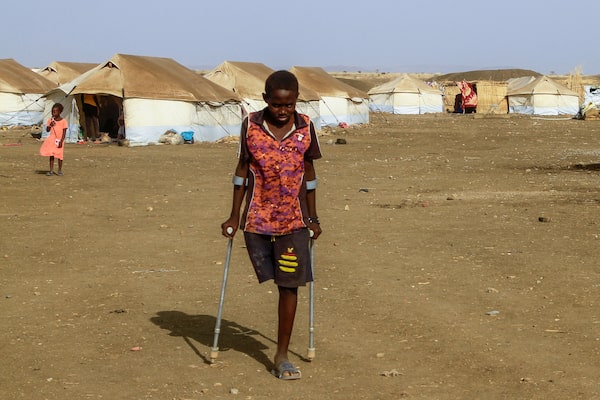
A picture taken on March 20, 2024, shows children who fled Khartoum and Jazira states in war-torn Sudan standing near tents at a camp for the internally displaced in southern Gadaref state.-/Getty Images
Despite grim warnings that Sudan could suffer a million deaths from war and famine this year, an appeal for humanitarian aid has reached less than 5 per cent of its target, diplomats and relief agencies say.
The war that erupted last April has triggered the world’s worst displacement crisis, with 8.5 million people forced to flee their homes, and is rapidly becoming the world’s biggest hunger crisis, with 18 million people facing acute food insecurity, according to United Nations estimates. Tens of thousands of civilians have been killed, many in massacres by armed fighters.
Earlier this month, the UN Security Council called for a ceasefire during the Muslim holy month of Ramadan, which began last week. But the fighting between the Sudanese military and the paramilitary Rapid Support Forces (RSF) has continued relentlessly since then.
“Everybody understands that this crisis is barrelling toward a point of no return,” said Tom Perriello, the U.S. special envoy for Sudan, at a media briefing Thursday.
“This is an urgent situation, where we are seeing signs of famine already across Sudan. We’ve known about horrific atrocities, particularly against women and children, forced recruitment, even slavery in this conflict. Now we’re seeing a situation that could quickly get much worse. The humanitarian crisis is already at a breaking point.”
The UN and its humanitarian partners have appealed for US$2.7-billion to help nearly 15 million people in Sudan this year, but they have received only US$131-million so far. Aid for Sudanese refugees is equally sparse, and the UN says it will have to cut its emergency rations for more than a million refugees who reached Chad and South Sudan.
“A humanitarian travesty is playing out in Sudan under a veil of international inattention and inaction,” said Edem Wosornu, director of operations at the UN’s humanitarian office, at a UN Security Council meeting Wednesday. “Simply put, we are failing the people of Sudan.”
In the coming weeks, more than 220,000 children could die of malnutrition, she said, quoting estimates from the UN’s humanitarian partners.
Some estimates are much higher. James Kariuki, the British ambassador to the UN, told the Security Council that the international community must increase its funding “to avoid the horrific scenario of one million excess deaths in Sudan this year.”
While authorities recently allowed a convoy of 60 trucks to enter Sudan with food aid, most humanitarian access is still blocked by the Sudanese military and the RSF, inflicting starvation on the country, Mr. Kariuki said.
Mr. Perriello said he is hoping to revive a formal set of peace talks between Sudan’s warring factions after Ramadan ends next month. “Every week we wait without a peace deal makes the potential for famine more protracted, and the atrocities that have been documented continue.”
He said he is concerned by signs of growing external interference in Sudan, including reports of Iranian assistance to the Sudanese military, which could spark a wider conflict. “This is just one example of something that could take an already disastrous situation and be fuel on the fire that helps turn this into a regional war.”
Mr. Perriello, who was appointed by U.S. President Joe Biden late last month, is on a seven-country tour of Africa and the Middle East. Sudanese people who have fled to those countries have told him that the situation is “hell on Earth,” he said.
One woman told him how Sudanese women are raped when they venture into farmer’s fields in a desperate search for food, yet they must return to those same fields the next day because of hunger, he said.
A communications blackout in many regions of the country, the result of internet and cellphone shutdowns imposed by the warring factions, means the full extent of the food crisis is unknown, Mr. Perriello said.
Carl Skau, deputy executive director of the UN’s food agency, the World Food Programme, said emergency relief operations are severely hampered by blockades that prevent aid from crossing the war’s conflict lines.
About 90 per cent of those in greatest need of food are trapped in areas that are largely inaccessible to humanitarian agencies, in places such as Khartoum and Darfur, he told the Security Council. “Our efforts to reach these civilians are challenged by the relentless violence and by interference from the warring parties.”
As war moves into Sudan’s traditional breadbasket regions, hunger is expected to grow worse in the coming months. The country’s cereal production dropped 46 per cent last year, according to a report this week by the UN’s Food and Agriculture Organization, and many farmers have been forced to abandon their fields.
“The conflict has driven up prices of basic food commodities by a staggering 83 per cent compared to the precrisis period,” Ms. Wosornu said.